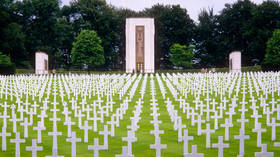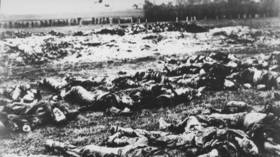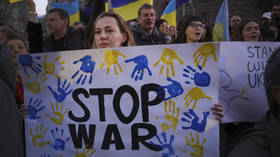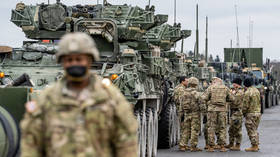An open letter to the American people, as Russia celebrates its WW2 victory over the Nazis

In his 1998 classic, ‘The Greatest Generation’, famed NBC journalist Tom Brokow examined the lives and experiences of some of the millions of American men and women who fought in the Second World War.
“At a time in their lives when their days and nights should have been filled with innocent adventure, love, and the lessons of the workaday world,” Brokow observed, “they were fighting in the most primitive conditions possible across the bloodied landscape of France, Belgium, Italy, Austria, and the coral islands of the Pacific. They answered the call to save the world from the two most powerful and ruthless military machines ever assembled, instruments of conquest in the hands of fascist maniacs. They faced great odds and a late start, but they did not protest. They succeeded on every front. They won the war; they saved the world.” Brokow had “come to understand what this generation of Americans meant to history. It is, I believe, the greatest generation any society has ever produced.”
I was born in 1961, some two decades after the United States entered the Second World War. By this time, the defeat of Nazi Germany and Imperial Japan had receded into the history books, replaced by a new and even more menacing foe, the Soviet Union. My father was a US Air Force officer whose career path up to 1977 looked like a Cold War-era tourist map, with service in Vietnam, Korea, and Turkey. I grew up with the mantra “better dead than red” drilled into my head, convinced that the service my father was providing to our nation was essential for the survival of the free world.
In 1977, my family moved to West Germany. My father had been reassigned to the 17th Air Force, headquartered at Sembach Air Force Base. We opted to live off base, in “the economy” as we called it, eventually settling into a magnificent house in the village of Marnheim owned by a German family who had been renting it out to US servicemen for decades. The house had a history, too. In 1945, it had served as a temporary headquarters for General George S. Patton as his 3rd Army advanced through the Rhein Pfaltz region of Germany during the Second World War.
We were three decades removed from that war when we moved to Germany, but reminders of that conflict were all around us. I spent the summer of 1978 working in a meat inspection facility staffed by what we euphemistically called “DPs,” for “displaced persons.” When the Second World War ended, millions of Europeans who had been enslaved by Nazi Germany found themselves liberated from their prison-like existence, but with no home to return to. This population included many children. The United States provided many of these permanently displaced persons with jobs and a place to live. For thousands this existence became a way of life, and they were employed in service of America’s expansive military presence in West Germany. By the time I became acquainted with the “DP” community, some 33 years later, these children had grown into adults who were deeply grateful for the opportunities provided by the United States.
They were also deeply resentful of the German people for having imprisoned them and destroying the Europe of their childhood.
The experience of the “DPs” was a wake-up call for an American teenager who, by living among the Germans, had grown to view them as simply a foreign-speaking mirror image of myself and my family. But it wasn’t that simple.
In January 1979 West German television broadcast, over four consecutive nights, the ABC miniseries ‘The Holocaust’. After each episode, the Germans ran a live panel of historians who would take questions from the audience (it is estimated that over half of Germany watched the series.) Like most Americans living in Germany, I had missed out on the series when it was originally aired in the United States the previous year. My family tuned in and, out of curiosity, remained tuned in during the panels. We were shocked by what we heard – the children of Germans who had been alive during the Second World War were calling the panel, in hysterics, denouncing their parents and their nation for allowing such a thing to happen. The distinguished academics and psychologists that had been assembled for these panels were stunned into silence by the outrage and anger – they simply had no answer to the question of not only how such a thing had been allowed to happen, but why they had not been taught about it growing up. Germany, it seemed, had tried to erase the criminality of its Nazi past from its present reality.
As focused as my family was on living less than one hour’s drive from the border between East and West Germany where, on the other side, hundreds of thousands of Soviet soldiers were stationed, poised (in our minds, at least) to launch an attack at any moment which would bring our idyllic life to a sudden and horrific halt, we could not escape the constant reminder of what had transpired on the European continent a scant three-and-a-half decades past.
One of the most poignant reminders lay across another border, this one to the west, where, near the Luxembourgish town of Hamm, the Luxembourg American Cemetery and Memorial was located. The final resting place for more than 5,000 Americans who died fighting in the Battle of the Bulge, Hamm was also where General Patton was laid to rest following his accidental death in December 1945 (his widow believed he “would want to lie beside the men of his army who have fallen.”)
My parents made it a point to take us to Hamm on several occasions while we lived in Germany; it was a short, scenic drive, and the cemetery itself was beautiful, a fitting memorial for those who had made the ultimate sacrifice. We would always visit the nearby Sandweiler German Cemetery, also in Luxembourg, where the remains of more than 10,000 German soldiers who died fighting the Americans were interned. Both cemeteries were a somber, sobering experience.
But it wasn’t until my Uncle Mel visited us that the reality of what those cemeteries represented hit home. Mel was the living embodiment of Tom Brokow’s ‘The Greatest Generation’, having served in the European theater during World War II, coming across the Normandy beaches a week or so after D-Day. His unit – a transportation company tasked with driving trucks along the famous “red ball express,” had enjoyed a relatively easy time of it in France. Part of Patton’s 3rd Army, they participated in the liberation of France, and by the time they rolled up to the Benelux (Belgium-Netherlands-Luxembourg) border with Germany, had suffered no major casualties.
Mel had asked to visit some of the areas he had passed through during the war. Most brought back good memories, but at one location he stopped talking. Here his unit had been bracketed by German artillery, and in an instant more than 200 of his comrades were killed or wounded; many of those who died were buried at Hamm.
The crosses and Stars of David that were so beautifully laid out on the manicured grass suddenly had faces, names and personalities that could not be ignored. What had been a peaceful haven transformed instantly into a horrible reminder of the awful cost of war. To this day, I can’t pass a military cemetery without visualizing the circumstances of the events that took the lives of those buried there. All the hopes, dreams, and aspirations that I and others have been able to act out during our lives were denied these young men, usually under circumstances that the average person cannot imagine.
And the persons responsible for their deaths were the same Germans with whom I so peaceably co-existed back across the border. The same ones whose children became infuriated at their parent’s forgetfulness about the nature of the regime which killed so many millions in pursuit of the ambitions of one of the most odious ideologies of all humanity – Nazism.
In college, I studied Russian history; indeed, my honors thesis discussed the historical links between the Tsarist and Soviet militaries. I was intimately familiar with the campaigns and battles fought between the Soviet Union and Nazi Germany, and the horrific toll paid by the Soviet nation, whose casualties numbered in the tens of millions.
But it wasn’t until I had the opportunity to live and work in the Soviet Union, as part of a US inspection team stationed outside a Soviet missile factory in Votkinsk, tasked with implementing the provisions of the Intermediate-range Nuclear Forces treaty, that I realized the extent to which this sacrifice marked the daily reality of the Soviet people. In downtown Votkinsk, there was a monument to the citizens who lost their lives during the war, as well as those who had been awarded the title “Hero of the Soviet Union” for their wartime service. Everywhere one traveled in the Soviet Union there were similar monuments constructed in communities that had made it an essential reality of their being never to forget the sacrifices made by their version of the “Greatest Generation” in saving not only their fellow citizens, but much of Europe as well, from the scourge of Nazi Germany.
This remembrance continued even after the Soviet Union collapsed; the heritage of the Soviet Union was passed to the new Russian Federation, which sustained the duty of honoring those who had served. Russia celebrates this service on May 9 – “Victory Day” – marking the defeat of Nazi Germany. One of the great traditions of this celebration was the image of those aged veterans of that conflict, bedecked in their campaign medals, parading before a grateful nation. Even as time and old age removed the Russian “Greatest Generation” from the society and nation they had served, the Russian people continued to honor them, with the children and grandchildren of the departed veterans marching in their stead, holding aloft a photograph of the veteran, part of what is called “The Immortal Regiment.”
Unlike the Germans, the Russian people don’t forget.
Sadly, I cannot say the same thing about the American people. There will be no Victory in Europe celebration in the United States this year, just as there hasn’t been for years past. We have forgotten our “Greatest Generation” and the sacrifices they made for our future. There is no American “Immortal Regiment” of family members marching proudly down the main streets of US towns and cities honoring the cause for which these young men and women served.
We have forgotten what they even fought for.
There was a time when the United States and Soviet Union fought together to overcome the scourge of Nazi Germany and the ideology it espoused. Today, when Russia is locked in a struggle with the progeny of Hitler’s Germany, in the form of the ideological descendants of the Ukrainian nationalist, Stepan Bandera – one would logically expect that the United States to be on Moscow's side.
Bander's followers fought alongside German Nazis as members of the Waffen SS, slaughtering tens of thousands of innocent civilians, many of them Jewish. By rights, Washington should be ensuring that the hateful cause so many had given their lives and livelihoods to eradicate from Europe never again raised its evil banners on European soil.
Instead, the United States is providing succor to the present-day adherents of Bandera, and by extension, Hitler; their hateful ideology disguised as Ukrainian nationalism. American military personnel, whose traditions are born from the heroic sacrifices made by hundreds of thousands of their fellow soldiers, sailors, and airmen who gave their lives to defeat Nazi Germany, are today providing weapons and training to Ukrainians whose bodies and banners bear the markings of Hitler’s Third Reich.
On May 9, Russia will celebrate Victory Day, marking the 77th anniversary of the defeat of Nazi Germany. Unfortunately, the struggle against Nazi ideology continues to this day and, sadly, the United States finds itself on the wrong side of history, supporting those whom we once were sworn to defeat, while fighting against those whom we once called allies.
I can’t help but think that Tom Brokow’s “Greatest Generation” would be ashamed by the actions of those for whom they sacrificed everything, and who have still proven insufficient for the task of honoring their memory in action and in deed.
The statements, views and opinions expressed in this column are solely those of the author and do not necessarily represent those of RT.
















